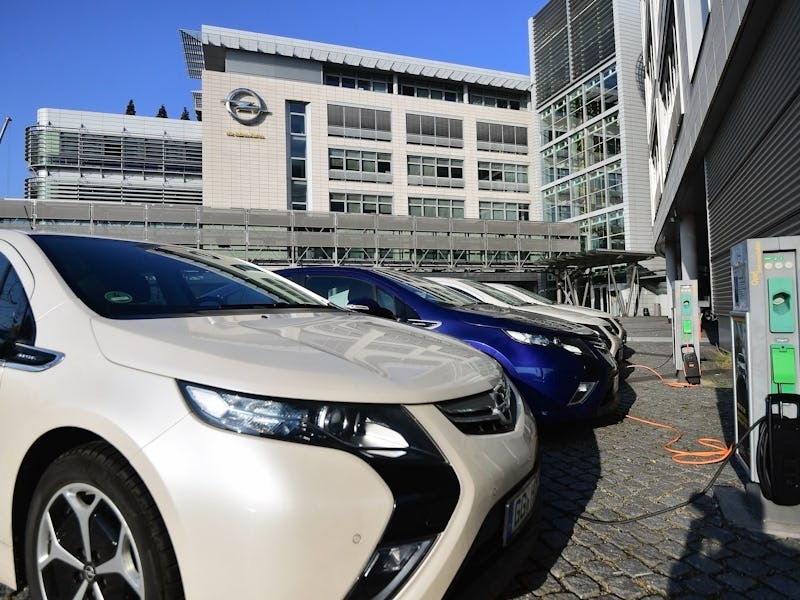General Motors' Decision to Leave Europe Could Help Electric Cars

General Motors is getting out of Europe and leaving its brands behind, finally calling it quits in a market where it hasn’t made any money in the past 18 years. GM announced Monday that it would sell its Europe operations, namely the Opel and Vauxhall brands, to Peugeot SA for $2.3 billion. While that might seem like a downer for the future of automotive innovation, the new deal could mean some of GM’s electric vehicle enthusiasm rubs off on Peugeot, one of Europe’s largest automakers.
“We look forward to our participation in the future success and strong value-creation potential of PSA through our economic interest and continued collaboration on current and exciting new projects,” Mary T. Barra, GM’s CEO, said in a statement.
The deal could prove to give a giant boost to the growing electric vehicle market. PSA Group, owners of Peugeot and Citroen, will benefit from access to GM’s electric car expertise, and the two are expected to collaborate on electric car tech after the deal. Following the deal, PSA will become Europe’s second largest carmaker behind Volkswagen, accounting for 17 percent of the total market share.
Prior to the deal, PSA has had a somewhat lackluster response to the rise of electric vehicles. Last week, the group revealed that it planned to release its own fully electric car in 2019, with new plans to develop its own electric drivetrain after rebadging other companies’ technologies. But CEO Carlos Tavares told Top Gear magazine that he didn’t see electric vehicles as a profitable prospect for the near future.
General Motors, on the other hand, has had a much stronger plan for electric vehicles. The Opel Ampera-e, a rebranded version of the Chevrolet Bolt EV, is set to go on sale in the continent later this year. The Bolt received rave reviews after it entered production in November 2016. With an acceleration time of 0-60mph in 6.5 seconds and an estimated range of 238 miles, Car and Driver claimed the car “gives Tesla a run for its money.”
The all-electric Chevrolet Bolt EV is shown on stage after it won the Car of the Year Award at the 2017 North American International Auto Show on January 9, 2017 in Detroit, Michigan.
The Ampera-e’s release signals part of a wider plan to aggressively push the brand’s electric technologies. Sources speaking to Manager Magazin (translated by Electrek) claimed in a story published last month that Opel CEO Karl-Thomas Neumann has pushed a strong electrification strategy, aiming for an all-electric lineup as soon as 2030.
GM has pushed the idea of using the Chevrolet Bolt technology in future cars. It’s also used the Bolt as a testing bed for autonomous car technology. Earlier this year, San Francisco-based Cruise Automation demonstrated on video a Bolt driving itself around the city. GM, which acquired Cruise last year, is using the technology to shuttle employees to work. A special smartphone app allows employees to request a ride.
The strong position of the PSA Group, combined with the expertise from the GM deal, could give electric vehicles in Europe a serious boost over the coming years.